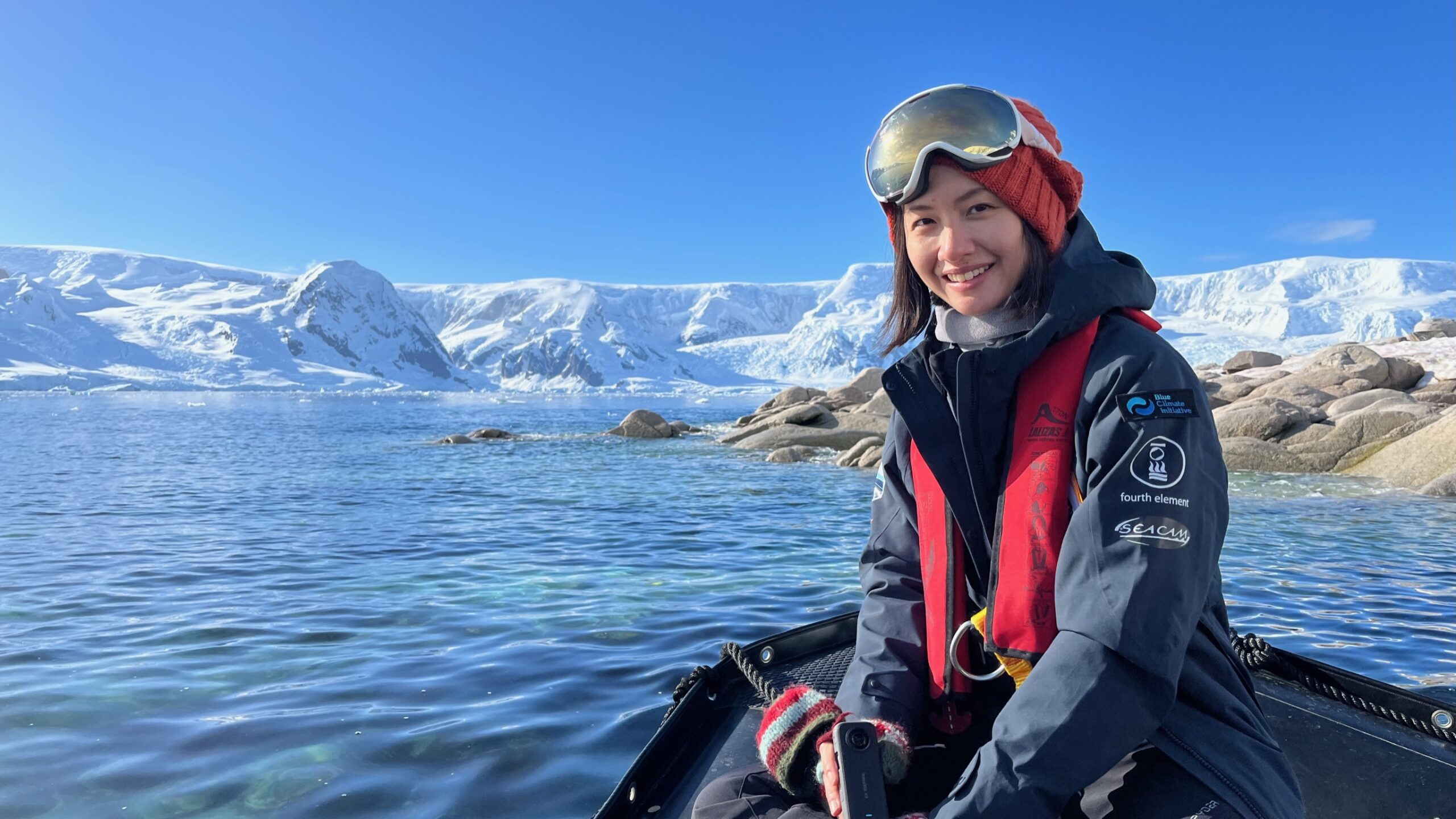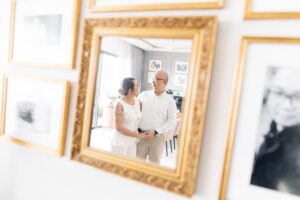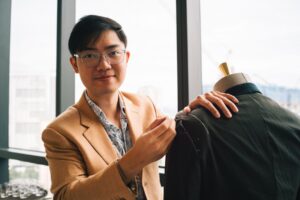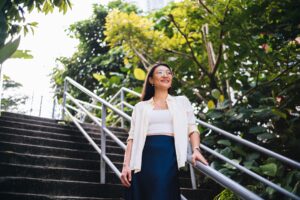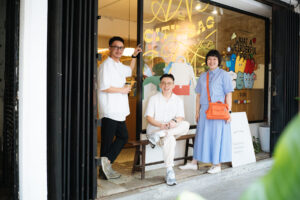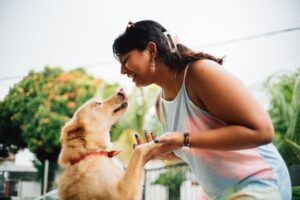When Melissa Tan was little, she would often play with the neighbourhood kids, swinging on a branch and splashing into a swimming hole somebody dammed up from the stream. Growing up in Taman Tun, beside Kiara Hills where it was surrounded by natural greenery — back then, a wild and lush space still, her childhood days were spent sitting amidst nature’s lap.
Years later, Melissa, who was working in the consulting industry after earning a degree in Actuarial Science, wasn’t fully introduced to environmental justice until she decided to establish a weekly animal shelter volunteer program that she’d run for two years during her tenure. There, she’d expose hundreds of people and help them build a deeper understanding of issues like animal welfare so that they can be advocates too.
She has had many important stops throughout her career – including modelling. Reality show fans might already be familiar with Melissa, who had then appeared in Asia’s Next Top Model. As her social media presence grew, she started sharing about zero-waste living and environmental activism and connecting people to resources and ideas. This led her to where she is now: the Country Coordinator for Fashion Revolution, where she is recognised as a leading voice for sustainability and environmental conservation.
With Fashion Revolution recently entering its tenth consecutive year, FirstClasse Malaysia speaks to Melissa Tan to find out more about her journey to becoming an activist, the activities and initiatives that she has undertaken, as well as her calling to inspire others to live a more sustainable life.
Tell us about your journey to becoming a climate activist and sustainability advocate.
I grew up caring deeply for animals and our environment. An environmentally-conscious child furiously recycling everything in sight. But there was so much that was not recyclable, especially with plastic. One day, I heard about the zero-waste lifestyle and the idea of how we can refuse the creation of trash in the first place, preventing harm before it’s created. That was a lightbulb moment for me. And it was like taking power back, being able to take action. I started to see my direct link to the world around me and how I can change that story.
So I started changing habits in everyday life, learning more, going down different rabbit holes and interconnected areas, reexamining and breaking habits in the cycle of excessive, irresponsible consumption. I shared about it on social media, and grew from there, connecting with people and throwing my voice and efforts behind the cause, collaborating with other passionate people. I saw how we can influence others to see and claim their roles in change as well so that together we can change the culture.
Tell us more about the activities and initiatives that you have done to protect our planet.
I create content and speak for environmental issues and how to take climate action on social media. I educate on the climate crisis, zero-waste living and how people can take action and incite change in their circles of influence. I host community events and learning spaces for people to engage in solutions. I collaborate with other organisations and fellow activists on projects.
You’re a country coordinator for Fashion Revolution. What took you from that individualistic Zero Waste approach to getting involved with fashion activism?
I grew up as the fast fashion industry ramped up, and was drawn into the lifestyle of overconsumption – I wasted a lot of time and money buying things that didn’t make me happy and my wardrobe was always packed to the brim, yet I always felt like it wasn’t enough. My years working as a fashion model and living from a suitcase gave me a lot of perspective on our relationship with fashion. Some days on shoot, I could wear more than 100 pieces in a day. Living from a suitcase, I felt liberated and found I dressed a lot better with my five outfits, rather than the 100s that overwhelm me in my wardrobe at home.
So I started reinventing my relationship with fashion to one that is more in touch with my sense of style, that breaks away from consumption, that pursues intentionality, circularity, and community – I started loving fashion and my (capsule) wardrobe.
As I learnt about the damage that the fast fashion industry causes, both to the people who make our clothes and to our environments, it reinforced my lessons and all the causes I care about. I started hosting community clothes swaps and saw people change their relationship with clothing as well, and eventually, when the role of Country Coordinator for the Malaysian office of Fashion Revolution came up, I knew it was right.
Fashion Revolution Week has now completed a decade since its first inception. How do you feel about this achievement? Do also share some highlights of FRW 2024 which happened over the weekend at Gaya HQ, how did it go?
It’s been powerful to see the power of the people build momentum over these last 10 years in over 90 countries as Fashion Revolution globally campaigned for a fair and clean industry. This year, Fashion Revolution Malaysia collaborating with Green Day Out; who champion community, climate and compassion at the beautiful 100% upcycled community space Gaya HQ, was a perfect fit.
People who share similar values and missions can also share strength, resources and ideas when we come together – and show more Malaysians that this can be the norm in our society – powered by connection and the common good, not consumption. Every cosy space had a workshop for people to engage in slow fashion practices, like swapping or caring for our clothes, or learning about the what’s what on sustainability in fashion. It was very fulfilling watching people go through their journey with like-minded individuals, as they discover their role in building a better fashion industry and culture – whether as citizens who wear clothes, who use social media or as people in the fashion industry itself.
Over the course of 10 years, what impact or changes have you noticed for consumers in Malaysia?
What used to be a fringe activity, thrifting culture, or “bundle” as it is known in Malaysia, has risen tremendously with bundle and thrift stores hitting the mainstream. You would have noticed large outlets mushrooming throughout the Klang Valley and other states. While they are vital avenues to recirculate fashion and encourage people to lighten their impact by embracing secondhand, I’ve also observed how thrift hauls and over-shopping have escalated further. People have also familiarised themselves with lower-impact materials like organic and recycled textiles.
In February 2023, you joined the Antarctic Climate Expedition and were the only Malaysian representative in a group of 110 ambassadors, comprising climate experts, conservationists, activists, entrepreneurs and artists. What was your biggest takeaway from the expedition?
There is no room for half-measures. We need radical action. Ocean protection as the default, rather than the option to be proven, is a great example of how in a lot of areas with the environment, we cannot compromise and play along with the current system.
During the expedition, we witnessed unusually large and wet snowfall in summer, unusual rainfall, penguin chicks born too late to survive, rapidly retreating glaciers and iceberg calvings, the expanse of snow algae, and microplastics in every sample – both air and water. Even at the bottom of the world with no human civilisation, our human impact is staggering and our survival depends on us taking this seriously.
Great minds and willpower can do so much. But the crucial piece of the puzzle is the unified agreement towards a common goal and people setting egos aside and everyone approaching it as students and fellow creatives, not masters with solutions in their pockets. The climate crisis is not one we have solved before, and it is a deeply complex human problem.
So, for 2024, what message do you want people to get behind?
We are all fashion revolutionaries. We are all part of changing the culture, and it starts with easy steps like pausing all forms of shopping activities, caring for your clothes, exploring alternatives like restyling, shopping your wardrobe, swapping, thrifting, and borrowing. Explore your true sense of style when it’s not driven by marketing and impulse. Learn about the impacts of fast fashion and how we can demand better of the industry.
We live in a digital world with easy access to information. Why do you think people are still not (as much as we’d want them to be) pro-environment in Malaysia?
Our surroundings often do not reinforce pro-environment values and it is not always obvious how we can translate awareness into action. People can often feel helpless and confused, limited to signing petitions and complaining on social media. I felt the same too, until I learnt about zero-waste living and taking an active role in the causes. Being a living example for others through your actions, speaking up and sharing ideas can encourage others to take action and accomplish more than staying at raising awareness about issues.
Tell us more about Community Circle, and how and where can the public participate.
Community Circles are where people come together to learn from one another practical and simple ways of redefining sustainability in fashion for themselves and learn more about the nuances, challenges and opportunities of a fairer, cleaner fashion industry. We as Fashion Revolution facilitate the conversation with fellow advocates and experts to share our individual, business, community and global experiences to deepen understanding and empower more Revolutionaries to lead their own lives and influence the people around them.
What more can be done for Malaysia’s fashion community?
Malaysians need to see more examples of what sustainability truly means in fashion. We need to speak out more about this and follow through with action. Dress with meaning, and share the stories. Personally, I haven’t shopped new in 6 years. Instead, I enjoy my capsule zero waste wardrobe – even with the pressure to dress well as a personality in front of the camera, on stages and in the public eye – I want to show people sustainability is super stylish. It doesn’t take away from you, it multiplies every intentional action you take.
Can you recommend some relevant reads or podcasts that we should be reading and listening to right now?
One of my favorites is the podcast The Angry Clean Energy Guy which gives you the reality of the structural gaps in our system in addressing the climate crisis. The perceived progress we see is often also a distraction, even a major stumbling block to truly transforming the systems we live in to one that puts our planetary and human health and our continued survival as the priority. It goes beneath the surface of greenwashing, ESG reporting, big announcements, carbon credits and so many different aspects of the climate space to reveal their inadequacies, and challenges us to not take things at face value.
Follow Melissa Tan on Instagram for more inspiring updates.




